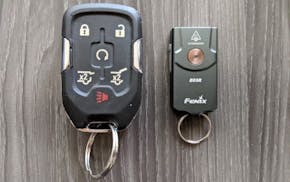Q My question has to do with our 2005 Acura RL and 2008 Acura TL. When we travel and leave one or both cars parked in our garage or in a long-term parking lot, we always return to find the car with a dead battery. The most recent episode occurred in February when we left the '05 for a week in Florida when we went on a cruise. We returned to a dead battery and had to call AAA. The dealership said there is nothing we can do about this because the battery has to power the car's computer even when the car isn't in use. Does this mean that we will always return to a dead battery after leaving the car for a few days?
A Typical "parasitic losses" -- current flow with everything turned off -- from modern vehicle electronics are in the 50-milliamp range or less, meaning a fully charged battery should hold its charge well enough to start the engine after sitting for several weeks.
Have the battery properly charged, then test its load and/or capacitance to determine its condition. Modern fuel-injected engines tend to start so quickly that a weak battery may be difficult to identify in daily driving. I suspect you'll find that in both batteries the ability to hold a charge and to deliver high starting amperage is compromised.
Testing both cars for excess parasitic losses might identify a problem, and new batteries might eliminate the issue for several years. In the short run, the quick fix is to install a master electrical switch or simply disconnect the battery while the vehicle is parked for any significant length of time. This is a cheap antitheft system as well.
Granted, the engine management system will have to relearn its fuel curve and idle characteristics, and you'll have to reset all the presets on the stereo and HVAC system, but at least you'll know the car will start when you return.
QOur 2010 Toyota Camry V6 has a noisy engine. For the first several miles it sounds like old-fashioned lifter clatter. The noise is most noticeable under light acceleration, and it goes away when the engine reaches operating temperature.
The Toyota dealer says the noise is normal. Is it?
AMost likely, yes. Fuel injectors in today's high-pressure fuel injection systems -- particularly in newer, direct-injection systems -- tend to make an audible clicking sound, particularly when the engine is started cold, because of the extra fuel delivered, and under acceleration.
The easiest way to determine where the clicking is coming from is to use an automotive stethoscope or a long wooden dowel rod to "listen" to the injectors and valve train. Unfortunately, getting access to these requires a fair amount of disassembly.
QThere seems to be a movement back to four-cylinder engines with turbochargers. Do factory-installed turbochargers shorten engine life?
AI sure hope not. The last three vehicles we've owned have been turbocharged VW Passats. We traded our '05 with 140,000 miles for an '07, which has 63,000 miles. And our youngest son drove a hopped-up turbo Jetta for well over 100,000 miles. No engine or turbo problems of any kind.
With today's better-quality lubricants -- especially synthetic motor oils -- along with water-cooled turbochargers, reliability isn't a problem.
QI have a 1994 GMC Sonoma with an intermittent problem. After driving a few miles, my speedometer goes erratic, the service engine light comes on, the brake light comes on, it backfires once or twice, shifts up and down a couple of times and then is OK for a while. I had it checked at a garage, and they said it may be one of the computers.
AI suspect the vehicle speed sensor. If the signal from this sensor is lost, the speedometer won't read correctly, and the computer won't know how fast the vehicle is traveling or what gear to be in.

Motormouth: Oil type not an issue



